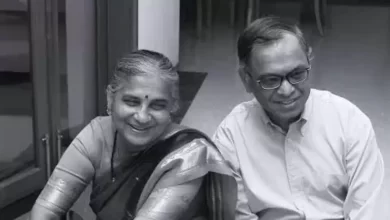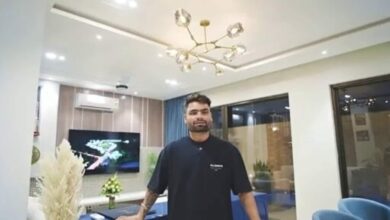Johnny Depp and Amber Heard to face off in defamation trial

The actor Johnny Depp could not convince a judge in London that he was innocent of allegations that he had abused his former wife, the actress Amber Heard, but in a trial starting Monday, the actor will take his defamation complaint to a jury in Virginia.
The U.S. trial centers on a lawsuit Mr. Depp filed against Ms. Heard, who wrote an op-ed in The Washington Post in 2018, after the couple divorced, saying she had become a “public figure representing domestic abuse.”
The piece did not mention Mr. Depp name, but the actor has asserted in court papers that it clearly referred to their relationship, and that his reputation and career were “devastated” as a result.
During three years of legal sparring in Virginia, Mr. Depp, 58, and Ms. Heard, 35, have shared pages of lurid details from their varying accounts of their marriage. Ms. Heard’s descriptions of “volatile and violent” episodes with Mr. Depp throughout their relationship included his slapping her, head-butting her, throwing her to the ground, and pulling out clumps of her hair, according to court papers.
In his lawsuit, filed in March 2019, Mr. Depp denied that he was a domestic abuser and said Ms. Heard’s accusations were an “elaborate hoax” intended to boost her public persona — one that succeeded in making her a “darling of the #MeToo movement.” Mr. Depp has said Ms. Heard had been the perpetrator of abuse, accusing her in court papers of punching, kicking him and throwing objects, including a vodka bottle that he said shattered on the countertop and severed the tip of one of his fingers.
“Mr. Depp brings this defamation action to clear his name,” the actor’s lawsuit said.
Ms. Heard said in court papers that she has never attacked Mr. Depp except in self-defense or in defense of her younger ser, and that Mr. Depp severed the tip of his finger when he smashed a phone against the wall during a violent outburst. “I have never physically abused anyone,” she wrote. “I know what that does to people.”
The trial in Fairfax County Circuit Court is expected to last about six weeks and will begin with jury selection. The proceedings will be televised, all but guaranteeing that they will become a public spectacle. Both parties are expected to testify. In addition, Ms. Heard’s l of potential witnesses includes several celebrities — among them Elon Musk and James Franco — and the evidence the two sides intend to put forward includes text messages between the couple, medical records and surveillance footage from Los Angeles, where they lived together.
(Ms. Heard exchanged texts with Mr. Musk about her marriage that were used as evidence in the British case, and she said in that trial that Mr. Franco saw the bruises on her face after an altercation that is in dispute.)
There are also weighty legal questions in play as jurors will be asked to review, not only Mr. Depp’s claim, but also issues raised in a countersuit Ms. Heard filed in 2020. It accused Mr. Depp of defaming her through his former lawyer, who gave statements to the media saying that Ms. Heard’s abuse claims were a hoax.
The trial is one of the most high profile examples of defamation cases that have arisen from the #MeToo era, and lawyers around the country are following it closely.
Jamie R. Abrams, a law professor at the University of Louisville Brandeis School of Law who has written about these cases, said this is one of a number in which the litigation ultimately becomes a trial over the truth of what happened, as lawyers on both sides seek to prove that their client could not have committed defamation if they were speaking honestly.
“I think legislators, litigators, and scholars are all watching this case and its parallels to see where the law settles after such a period of turbulence,” she said.
Another key question is how the British trial will factor in. A judge in London found in 2020 that there was “overwhelming evidence” that Mr. Depp had assaulted Ms. Heard repeatedly during their marriage, writing that Mr. Depp had put the actress “in fear of her life.”
Lawyers for Ms. Heard sought to convince the judge in Virginia to embrace her British counterpart’s findings, arguing that the issue at the core of both cases was the same: whether Mr. Depp had abused Ms. Heard. Judge Penney S. Azcarate declined to do so, writing in her decision that Ms. Heard was not the defendant in the British case — it was a British newspaper that called Mr. Depp a “wife beater” — and Mr. Depp did not have access to a jury trial there.
Judges often exclude previous trials such as this one from the evidence a jury is allowed to consider and even restrict mention of such background so the jury will not be unfairly swayed, Lee Berlik, a defamation lawyer in Virginia, said. But Ms. Heard’s lawyers can argue that aspects of it are relevant to her case and therefore should be shared with the jury.
“Naturally, Amber Heard is going to want to do everything she can to make the jury aware of that because Johnny Depp lost,” Mr. Berlik said, referring to the London libel case. “Conversely, Johnny Depp will want to do everything he can to make sure it is not mentioned.”
Lawyers for Mr. Depp and Ms. Heard declined to comment on the specifics of how the British case would be handled at the American trial.
The former couple met when Ms. Heard was cast as Mr. Depp’s love interest in the 2011 film “The Rum Diary” and were married in 2015. The next year, a court in California granted Ms. Heard a temporary domestic violence restraining order against Mr. Depp after she alleged “emotional, verbal and physical abuse” in a petition to the court, detailing a recent incident in which she said Mr. Depp violently shoved her to the floor and threw a champagne bottle at the wall after her 30th birthday party, and another in which she said he threw a cellphone at her, hitting her in the face.
In court papers, Mr. Depp has denied Ms. Heard’s version of events, saying she punched him in the face repeatedly after he was late for her birthday dinner and accusing her of faking a bruise on her face to obtain the restraining order, which she ultimately withdrew. (Ms. Heard dismissed her petition for a longer term restraining order as part of their divorce agreement, her lawyers wrote in court papers.)
After the couple divorced, The Washington Post published Ms. Heard’s op-ed, but the newspaper has not been named as a defendant in the case. Online, the op-ed was titled, “I spoke up against sexual violence — and faced our culture’s wrath.”
“A movie I was attached to recast my role,” the op-ed read. “I had just shot a two-year campaign as the face of a global fashion brand, and the company dropped me. Questions arose as to whether I would be able to keep my role of Mera in the movies ‘Justice League’ and ‘Aquaman.’”
Though it catalogs the damage she said she suffered going public, the op-ed did not detail her allegations of the abuse she says she suffered at the hands of Mr. Depp.
The op-ed identified Ms. Heard as an ambassador on women’s rights at the American Civil Liberties Union, and she said in court papers that the A.C.L.U. — whose executive director, Anthony Romero, is also led as a potential witness in the trial — suggested that Ms. Heard write the piece and submitted it to the newspaper.
Mr. Depp claims in the lawsuit that after the op-ed was published, the damage to his career and reputation was “swift and severe.” Days after, Disney confirmed that Mr. Depp would not be returning to one of his most prominent film roles as Captain Jack Sparrow in a possible “Pirates of the Caribbean” reboot, according to his lawsuit.
“He was denied an opportunity to reprise that role immediately on the heels of Ms. Heard’s false and defamatory op-ed,” the lawsuit said.







